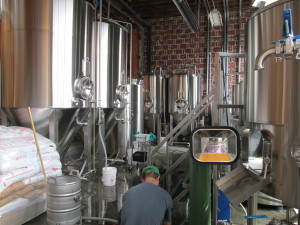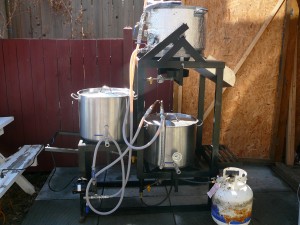Then move to Portland.
In Portland the jump from homebrewer to commercial brewery is smaller than anywhere else I know. Two cases in point: The Commons Brewery and Green Dragon Brew Crew. I will write in more detail about each of these interesting projects later, but I wanted to highlight how the economics of beer work differently in Portland.
The Commons is a small craft brewery specializing in Belgian-inspired ales, including a barrel aging program, but with a German lager side, too. Currently it is a 3,000 square foot brewery with a 8.2 hectolitre (7 BBL) system – so still pretty small. But it has the humblest possible of beginnings. The Commons began life in 2011 in the garage of founder and owner Michael Wright. Somehow he was able to get a license to brew beer in his 300 sq.ft. garage on a 40-gallon (about 160 litre) homebrew system. He sold his first batches of beer to accounts literally within a one mile radius of his house. It didn’t take very long for Wright to realize making a couple kegs at a time was “obviously not going to be a good business model”. So he took a deep breath, did some creative financing and set up his existing brewery. Three years later he is actively pursuing a second expansion as he is out of both room and capacity. Wright’s story is fascinating and he is an interesting, thoughtful guy, so I will write a more complete profile soon. But the nature of his start speaks a lot to the potential that can be created with the right climate.

…to this? (ABOVE: Your humble author’s humble homebrew system; BELOW: the bursting-at-the-seams set up at The Commons Brewery in Portland.)
The Portland-based Oregon Brew Crew is one of the U.S.’s oldest and largest homebrew clubs. A few blocks from their usual meeting location (a popular homebrew supply business) is the Green Dragon a craft beer pub associated with Buckman Botanical Brewing, owned by Rogue Ales (more on that another time as well). Buckman has partnered up with the Oregon Brew Crew to allow different members of the club to brew on Buckman’s one barrel (about 115 litres) test brewhouse. A new beer is produced each week and released every Wednesday. The product is called Green Dragon Brew Crew, for obvious reasons. Last week when I was there it happened to be the 200th batch in the series, a hoppy Belgian Double Golden Ale (their term) called The Delightful Hildegard.
I was unable to learn the exact process for selecting brewers and recipes, but apparently the Brew Crew has a stringent selection criteria, meaning not everyone can brew on the system, and not every beer gets a go-ahead. Still, it is a direct avenue for local homebrewers to try their hand at commercial brewing. Sure, it is not a massive 2,000 hectolitre behemoth or anything, but I imagine the details of brewing for pub consumption on a slightly larger system add complications we homebrewers don’t normally find at home.
There is no real avenue like that in western Canada. At times homebrew competition winners get the right to have their beer brewed at a craft brewery (Alley Kat, Half Pints, Paddock Wood and likely others have all offered this in the past), but that is a slightly different situation. It is a one-off and my understanding is the breweries take a highly active role in tweaking the recipe and ensuring the brew day does smoothly. I am told the Green Dragon project, while still overseen by Buchman Brewing staff is a more hands-off approach.
My eyes twinkle at the thought of having a pub in western Canada that offered up a homebrewer’s quaff as a regularly rotating weekly special. Over time all of the best homebrewers in the region would get their turn to do a beer (and maybe even a blog-writing, Portland-traveling homebrewer or two). Benefits abound: homebrewers improve their chops and take a partial step, if they choose, to professional brewing; consumers get a new, local, interesting beer each week; and the associated brewery and pub get a solid reputation as being connected to the community. Plus it advances good beer culture generally.
For many of us longtime homebrewers in western Canada we long ago gave up the thought of jumping professional. Few of us had a half million or so laying around to start up a full-size microbrewery; many of us had day jobs that did a better job paying the mortgage than an entry-level professional brewing job; and the rules forbade any kind of garage-based, small scale effort.
Despite the elimination of minimum production capacity, the rules in western Canada still prevent garage-based breweries. And I am convinced the economics are not quite there yet in our part of the world. Regina, or Edmonton, or Winnipeg are DEFINITELY not Portland. How many of us have multiple pubs within walking distance of our house that would be open to selling our unknown garage-created beer? I know I don’t. And that is why small-scale brewing is about BOTH rules and economics.
Still, it is fun dream.


Leave a Reply